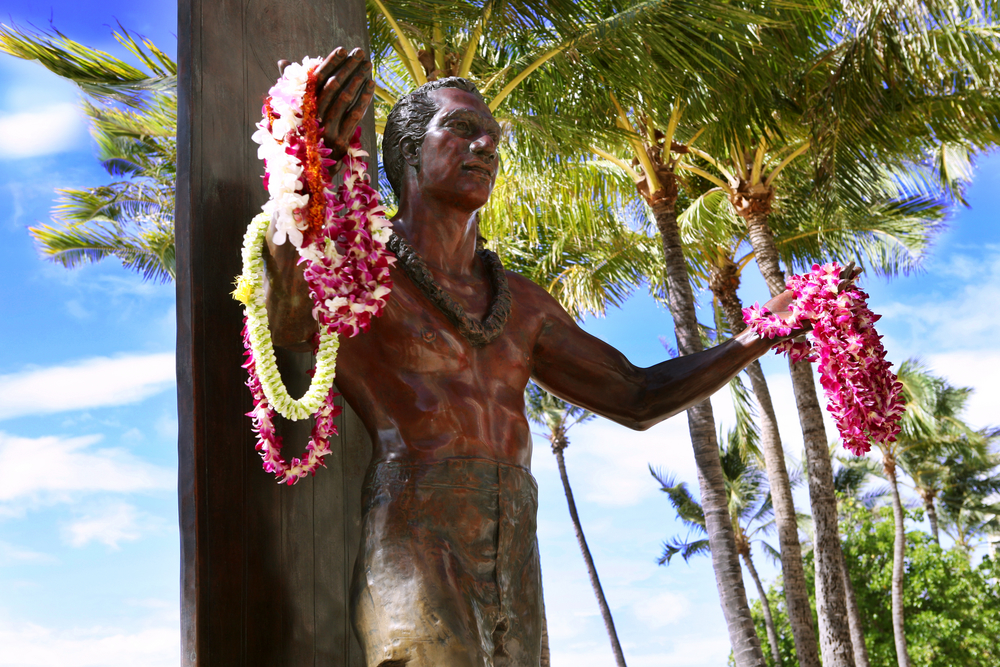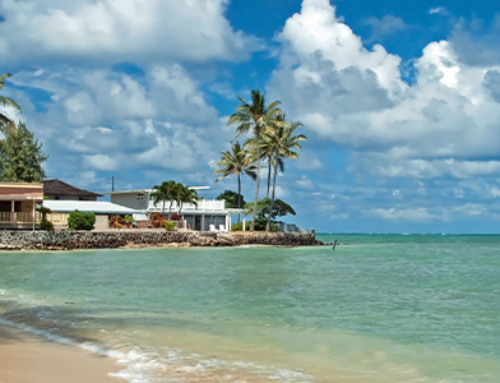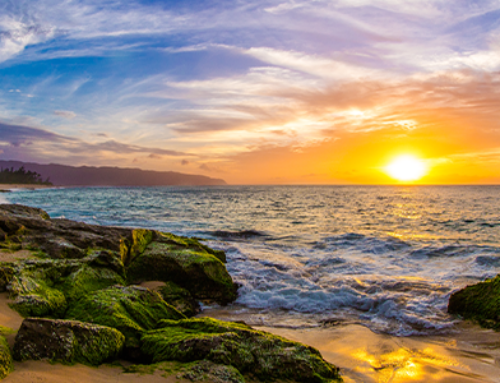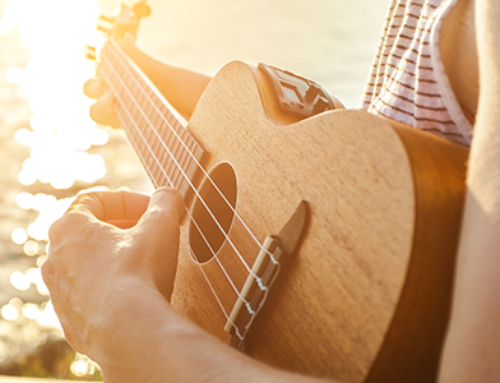Hawaii residents speak more than 130 languages. Among that list is Pidgin, officially recognized as Hawaiian Pidgin English by the Census Bureau.
Pidgin originated as a way for waves of immigrants from China, Japan, Korea, Portugal, the Philippines, Europe, and other origin points to communicate with Native Hawaiians and each other once they arrived in Hawaii.
According to census data, more than 1,200 Hawaii residents speak Pidgin at home today. You’ll also hear Pidgin words and phrases sprinkled into everyday conversation all over Hawaii.
Now, if you didn’t grow up speaking Pidgin, we don’t suggest you start now. (Trust us on this one.)
However, if you’re traveling or living in Hawaii, you’ll find the below list of Pidgin words and phrases quite useful for navigating everyday life. We’ve offered the most common spellings and definitions, but these are fluid—and regional. You’ll see plenty of variation during your time in Hawaii.
Note: Speaking Pidgin often involves words borrowed directly from the Hawaiian language. We focused on exclusively Pidgin words in this article. If you want to brush up on your Hawaiian, check out our article on the 14 Hawaiian words and phrases you need to know.
Howzit?!
Probably the most common Pidgin word you’ll hear. Howzit is a greeting, like “Aloha!” or “What’s up?!” For example: Howzit, brah?!
If you want a live demo, check out this episode of Tin Tin Teaches:
Brah
Short for bruddah (brother). Similar to “bro,” “buddy,” “man,” or “dude”—but with a distinctly Hawaiian flair.
If someone asks you, “Eh, brah, how you stay?” they’re essentially saying, “Hey man, how are you?”
Chicken Skin
Goosebumps, usually from an incredible, amazing, or scary event. Witnessing a legendary performance of a song or listening to a good Hawaiian ghost story can give you chicken skin.
Here’s a good example featuring Maui-born baseball star Kurt Suzuki:
It was a chicken skin evening in Oakland as #Angels catcher, #Hawaii’s Kurt Suzuki said #Aloha in final start of 16 year MLB career https://t.co/CielNKQ1jp #MLBHawaii #Maui 🤙🏽 @kurtsuzuki pic.twitter.com/UR19C4NRcD
— Rob DeMello (@RobDeMelloKHON) October 5, 2022
Da Kine
The popular surf brand got their name from this Pidgin phrase. On the simplest level, da kine means anything you can’t remember the name of, equivalent to “whatchamacallit.”
However, da kine’s extended usages are as broad as the possible people, places, and items that this phrase references. Expect to hear it used in versatile ways in Hawaii.
Entertainer and comic Andy Bumatai breaks down the “mysterious and magical” phrase in this episode of the Daily Pidgin:
Grindz / Grinds
Food. The best kind are ono (delicious). And the very best are…
So Ono, Broke Da Mout’!
Utterly delicious. Reserved for only the best of the best grinds.
Chee Hoo!
An exclamation of celebration or joy. Something you might shout when you see a friend catch a particularly sweet ride on a wave. You’ll hear it all over Hawaii, but it’s originally Samoan in origin.
You’ll also hear a solid chee hoo from the character Maui in the movie Moana, voiced by Duane “The Rock” Johnson. Below, you’ll hear an excellent Big Island rendition in this Hawaii News Now clip (endorsed by the Rock himself!):
Love this! Carry on our tradition big sole’! #Maui #CheeHoo 🤙🏾 https://t.co/Bw86ekoueA
— Dwayne Johnson (@TheRock) January 12, 2018
Rubbah Slippahs
Flip-flops, or (rubber) slippers, as they’re most often called here in Hawaii. Best left by the door before entering anyone’s home.
Stink Eye
Surfers around the world have adopted this phrase, which means to give someone a dirty look. The goal: to intimidate the other person or to express your displeasure because they’ve done something wrong.
If someone steals a wave that was yours by position, you might give them stink eye as they paddle back out.
Like
Want to. “You like surf?” doesn’t mean “Do you like to surf?” Instead, it means, “Do you want to go surfing now?”
Beef
To fight. Most commonly heard if someone is asking if you want to fight: “Eh brah, you like beef?” In other words, “Hey man, you wanna fight?”
Talk Story
To chat, gossip, catch up. If you drop your car at your mechanic’s, rather than leaving right away, you might stop and talk story for a bit about what’s been going on lately.
Bumbai / Bumbye
Like da kine, bumbai is a versatile word. It can mean “later” or, according to Pidgin to da Max, “soon enough,” as in “Bumbai we going ovah Harold’s.”
Let Tutu Flo explain it to you:
@tutuflo Pahteh at Flo’s house #pidgin #hawaii #ItsGreatOutdoors #AmazonMusicProudHeroes #pidginenglish ♬ original sound – Flo & Jacie
Choke
Plenty, full of. If the tree’s got choke avocados, you can expect to make guacamole soon.
Hamajang / Hemajang
Messed up. After an accident, a car might be hamajang.
Or, if you haven’t had a haircut in a while, your hair might be all hamajang. Mojo Barbershop in Honolulu to the rescue:
#hichinatown, need to look classy for the 3 day weekend? @mojobarbershop is your answer. #handsomenothamajang pic.twitter.com/NTUk4qO1A1
— Chinatown Now (@ChinatownNow) August 31, 2013
Bus’ Up
Busted up, messed up. How a car might also be after an accident—all bus’ up.
Stuffs
Things. As you can see in the KITV clip below, as part of his storm prep, Karl from Kalihi made sure to “buy some stuffs” from Costco:
Rajah
A confirmation. Roger. May be accompanied by dat, as in: “You like surf?” / “Rajah dat.” (“You wanna go surfing?” / “Roger that.”)
Shootz
An affirmation, similar to rajah. In other words, yes or “let’s do it.”
“You like surf?” / “Shootz.” (“You wanna go surfing?” / “Let’s go!”)
No Can
To not be able to. The opposite of shootz, in some ways.
“You like surf?” / “No can today.” (“You wanna go surfing?” / “I can’t today.”)
Or as the sign at Verna’s Drive-In in Hilo puts it:
View this post on Instagram
“If no can, no can. If can, Verna’s.”
One
An indefinite article, used in place of a/an. “Get me one green bottle,” would mean, “Get me a Heineken.”
Side
Area. “Let’s go Kaupo side” means “Let’s head over to Kaupo.”
Mo’ Bettah
Literally “more better,” but delivers a big emphasis—i.e., the best. “Molokai mo’ bettah.” (“Molokai is the best.”)
Stay
Can mean where someone lives. “She stay Waimanalo side.” (“She lives in Waimanalo.”)
Or, it can also describe how someone is. “Dat braddah stay akamai.” (“That guy is really smart/clever.”) Or: “How you stay?” (“How are you?”)
Chance ‘Um
Try it. If you’re deciding whether or not to paddle for a wave, a friend might encourage you to chance ‘um (go for it)!
Try Wait
Hold on a minute. Wait, please. A great phrase to learn since life in Hawaii can involve a lot of waiting around. Someone might tell you “try wait” if they need to go away for a moment, but they’re coming right back.
#Pidgin phrase of da day: Try Wait. Definition: Please wait, be patient; hold on a second. #hawaii #slang #trywait
Eh, try wait! pic.twitter.com/iq05kENqiQ— Local Kine Words (@LocalKineApps) March 24, 2017
Want More Pidgin?
We highly recommend the amusing and informative Pidgin to da Max and Pidgin to da Max Hana Hou! The definitions and the illustrations will tell you everything you need to know—and they’ll make you laugh along the way. We also recommend Da Kine Dictionary by Da Pidgin Guerilla himself, Lee Tonouchi, which offers a more modern take on Pidgin.
If you’re planning on moving to Hawaii, getting some understanding of Pidgin is a good first step toward understanding the culture you’ll find here in the Aloha State. If you want to learn more about Hawaii, you might also enjoy the following articles:
- The Meaning of the Shaka: Hawaii’s Classic Hand Gesture
- Discover Pele, the Mysterious Goddess of Hawaii’s Volcanoes
- 14 Hawaiian Words & Phrases You Need to Know Before Moving to Hawaii
And when you’re ready to make the move to Hawaii, we’d be happy to help! With teams and warehouses on Oahu, Maui, Kauai, and the Big Island, we can help you get wherever you want to go in Hawaii. Just reach out for a complimentary quote to get started.
Tell us about your move!



